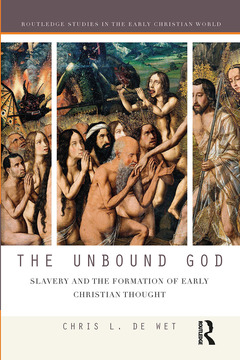The Unbound God Slavery and the Formation of Early Christian Thought Routledge Studies in the Early Christian World Series
Auteur : de Wet Chris L.

This volume examines the prevalence, function, and socio-political effects of slavery discourse in the major theological formulations of the late third to early fifth centuries AD, arguably the most formative period of early Christian doctrine. The question the book poses is this: in what way did the Christian theologians of the third, fourth, and early fifth centuries appropriate the discourse of slavery in their theological formulations, and what could the effect of this appropriation have been for actual physical slaves? This fascinating study is crucial reading for anyone with an interest in early Christianity or Late Antiquity, and slavery more generally.
Chapter 1 Introducing Early Christian Doulology: Slavery to God, Doulological Classifications, and Early Christian Identity
Chapter 2 Savior or Slave? Philippians 2:6–11 and the Problem of Slavery in Origen’s Christology
Chapter 3 Emancipating the Spirit: Slavery and Early Christian Pneumatology in Eunomius and Basil of Caesarea
Chapter 4 The Curse of Ham (Gen. 9:18–27): Slavery, Sin, and Punishment in John Chrysostom, Augustine, and the Cave of Treasures
Chapter 5 Conclusion: The Unbound God
Primary Sources
Secondary Sources
Index
Chris L. de Wet is Associate Professor of New Testament and Early Christian Studies at the University of South Africa, and the Editor of the Journal of Early Christian History. He is also the author of Preaching Bondage: John Chrysostom and the Discourse of Slavery in Early Christianity (2015).
Date de parution : 12-2021
15.6x23.4 cm
Date de parution : 06-2017
15.6x23.4 cm
Thèmes de The Unbound God :
Mots-clés :
Early Christian Thought; Early Christian; Ancient slavery; Early Christian Authors; Basil of Caesarea’s De Spiritu Sancto; Spiritual Taxonomies; Early Christianity; Metaphorical Slaveries; Jerome’s Vita Malchi; Late Antique Syria; Late antique slavery; Secular Slave; Philippians 2; Early Christian Discourse; Slavery; Slavery and Christianity; Natural Slavery; Slavery and Eschatology; Early Christian Asceticism; Slavery and early Christianity; Eschatological Punishment; Slavery in the ancient world; Early Christian Literature; doulology; Early Christian Identity; early Christian doctrine; Origen’s Thought; early Christian hamartiology; Quo Vadimus; slavery and theology; Origen’s Understanding; slavery discourse; Unbegotten Father; slavery in scripture; Holy Spirit; slaves in the ancient world; Trinitarian Debates; Concerted Effort; Cultural Historical Reading; Origen’s Argument; Father’s Nakedness; Slave Doctor



